Die Tore der Welt
Authors: Michael Rieneck & Stefan Stadler
Publisher: Kosmos
Year: 2009
review by

| x |
|
|
|
|
|
|
|
|
|
|
|
|
|
|
|
|
|
|
|
|
|
|
|
|
|
|
|
|
|
|
|
|
|
|
|
|
|
|
|
|
|
|
|
|
|
|
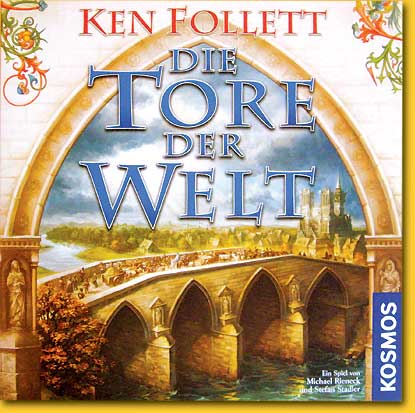 |
|
The most beautiful cathedral of the country has been built, but the Englisch village of Kingsbridge is now dealing with other problems. The clergy and the merchants are continuously fighting, the king is collecting high taxes to finance his wars, and the plague is spreading among the villagers. Fine ingredients for a new book, thought Ken Follett, and for a game, agreed Stefan Stadler and Michael Rieneck. In these hard times, the players struggle to survive, to lead a good and pious life, and to improve their social status whenever possible.
|
|
| x |
|
|
|
|
|
|
|
|
|
|
|
|
|
|
|
|
|
|
|
|
|
|
|
|
|
|
|
|
|
|
|
|
|
|
|
|
|
|
|
|
|
|
|
|
|
|
| The game is divided into four eras. Each era consists of six rounds. Each round an event card is drawn. This card shows what event affects all players in the current round; often, these events are not very pleasant (pay victory points, money or goods, remove a house from the board, skip the action phase). Additionally, in the four corners of the event card, the income of the players is shown. The starting player decides which player receives what, by turning the card so that the corners are pointing toward the appropriate players. He receives an extra favour that is also determined by how he has positioned the card on the board. |
|
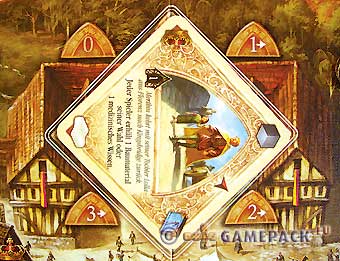 |
|
| x |
|
|
|
|
|
|
|
|
|
|
|
|
|
|
|
|
|
|
|
|
|
|
|
|
|
|
|
|
|
|
|
|
|
|
|
|
|
|
|
|
|
|
|
|
|
|
|
|
| x |
|
|
|
|
|
|
|
|
|
|
|
|
|
|
|
|
|
|
|
|
|
|
|
|
|
|
|
|
|
|
|
|
|
|
|
|
|
|
|
|
|
|
|
|
|
|
| Subsequently all players perform an action by playing one of their 12 action cards. A second action card is discarded facedown; this action cannot be used in the current era. The action cards allow the players to for example collect building resources, grain or holy statues, sell goods on the market for money, or gain victory points by contributing to building projects or by curing villagers suffering from the plague. |
|
| x |
|
|
|
|
|
|
|
|
|
|
|
|
|
|
|
|
|
|
|
|
|
|
|
|
|
|
|
|
|
|
|
|
|
|
|
|
|
|
|
|
|
|
|
|
|
|
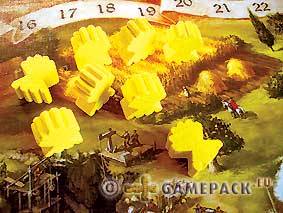 |
|
After six rounds each player has used six of his action cards, and discarded the other six to no effect. Then, the era is over; each player has to discard two grain to survive, and he has to show that he has lived a pious life by handing in two holy statues, and of course the taxes have to be paid: 2 to 5 gold, depending on a die roll. If a player is unable to provide all the necessary items he will lose victory points, and he receives a nasty penalty in the first round of the next era (no income, skip the action phase). After the fourth era the game is over. The player with the most victory points wins the game.
|
|
| x |
|
|
|
|
|
|
|
|
|
|
|
|
|
|
|
|
|
|
|
|
|
|
|
|
|
|
|
|
|
|
|
|
|
|
|
|
|
|
|
|
|
|
|
|
|
|
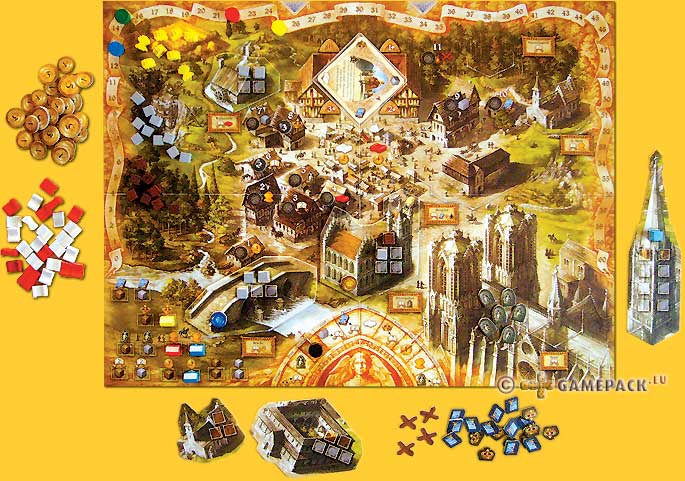 |
| x |
|
|
|
|
|
|
|
|
|
|
|
|
|
|
|
|
|
|
|
|
|
|
|
|
|
|
|
|
|
|
|
|
|
|
|
|
|
|
|
|
|
|
|
|
|
|
| x |
|
|
|
|
|
|
|
|
|
|
|
|
|
|
|
|
|
|
|
|
|
|
|
|
|
|
|
|
|
|
|
|
|
|
|
|
|
|
|
|
|
|
|
|
|
|
| x |
|
|
|
|
|
|
|
|
|
|
|
|
|
|
|
|
|
|
|
|
|
|
|
|
|
|
|
|
|
|
|
|
|
|
|
|
|
|
|
|
|
|
|
|
|
|
 |
|
|
|
|
|
|
|
|
|
|
|
|
|
|
|
|
|
|
|
|
|
|
|
|
|
|
|
|
|
|
|
|
|
|
|
|
|
|
|
|
|
|
|
The game looks beautiful, although it takes some time to discover what is what on the crowded board. But then it turns out that the board mainly has an illustrative function; most of the actions take place behind the players' screens. More relevant for the gameplay is that the icons on the action cards are very clear and self-explaining.
|
|
| x |
|
|
|
|
|
|
|
|
|
|
|
|
|
|
|
|
|
|
|
|
|
|
|
|
|
|
|
|
|
|
|
|
|
|
|
|
|
|
|
|
|
|
|
|
|
|
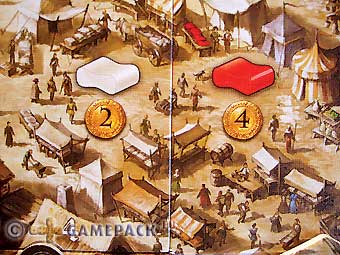 |
|
It is not easy to collect the required amount of grain, statues and money at the end of each era. The penalty if you fail is so high that all players try their very best to fulfil the requirements. If there is time, resources and energy left to earn some victory points in the process, then it's added bonus, but that's not the first priority!
 
|
|
| x |
|
|
|
|
|
|
|
|
|
|
|
|
|
|
|
|
|
|
|
|
|
|
|
|
|
|
|
|
|
|
|
|
|
|
|
|
|
|
|
|
|
|
|
|
|
|
|
Also, the events can be very brutal. Because players can only use half of their action cards each era, they try to plan ahead what they want to achieve in this era. The event cards can really mess up their plans; just when you have collected enough building resources to make a large contribution to one of the building projects on the board, the event card 'no building is allowed in the current era' shows up... This creates the feeling of fighting the game rather than the opponents.
|
|
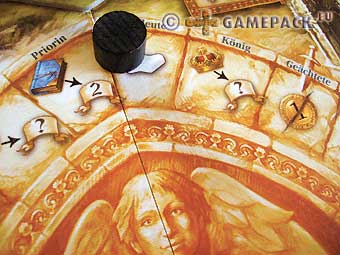 |
| x |
|
|
|
|
|
|
|
|
|
|
|
|
|
|
|
|
|
|
|
|
|
|
|
|
|
|
|
|
|
|
|
|
|
|
|
|
|
|
|
|
|
|
|
|
|
|
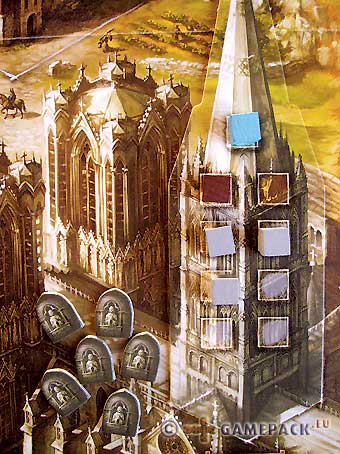
Speaking of the opponents: you won't see much of them during the game. Players take turns deciding who receives what type of income, and they provide building materials for the same building projects, but otherwise they are solitarily collecting goods and victory points. All things considered Die Tore der Welt is a nice game, but with a little bit too much randomness and too little player interaction. It's a rather long game: 120 minutes.
© 2009 Barbara van Vugt
|
x |
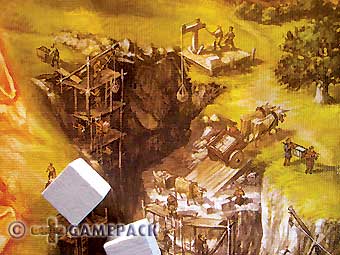 |
|
Is this kind of detail necessary? No, but it sure adds to the atmosphere!
|
|
x |
|
 |
| x |
|
|
|
Die Tore der Welt / World without End, Michael Rieneck & Stefan Stadler, Kosmos / Mayfair Games, 2009 - 2 to 4 players, 12 years and up, 90-120 minutes
|
|
  |
|
|
|
|
|
|
|
|
|
|
|
|
|
|
|
|
|
|
|
|
|
|
|
|
|
|
|
|
|
|
|
|
|
|
|
|
|
|
|
|
|
|
  |
|
|
|
|
|
|
|
|
|
|
|
|
|
|
|
|
|
|
|
|
|
|
|
|
|
|
|
|
|
|
|
|
|
|
|
|
|
|
|
|
|
|
  |
Beautifully executed with lots of atmosphere, and many nice dilemmas |
  |
|
|
|
|
|
|
|
|
|
|
|
|
|
|
|
|
|
|
|
|
|
|
|
|
|
|
|
|
|
|
|
|
|
|
|
|
|
|
|
|
|
|
  |
A bit too much of a hassle |
  |
|
|
|
|
|
|
|
|
|
|
|
|
|
|
|
|
|
|
|
|
|
|
|
|
|
|
|
|
|
|
|
|
|
|
|
|
|
|
|
|
|
|
  |
|
|
|
|
|
|
|
|
|
|
|
|
|
|
|
|
|
|
|
|
|
|
|
|
|
|
|
|
|
|
|
|
|
|
|
|
|
|
|
|
|
|
| x |
|
|
|
|
|
|
|
|
|
|
|
|
|
|
|
|
|
|
|
|
|
|
|
|
|
|
|
|
|
|
|
|
|
|
|
|
|
|
|
|
|
|
|
|
|
|
| x |
|
|
|
|
|
|
|
|
|
|
|
|
|
|
|
|
|
|
|
|
|
|
|
|
|
|
|
|
|
|
|
|
|
|
|
|
|
|
|
|
|
|
|
|
|
|
 |
|
|
|
|
|
|
|
|
|
|
|
|
|
|
|
|
|
|
|
|
|
|
|
|
|
|
|
|
|
|
|
|
|
|
|
|
|
|
|
|
|
|
 |
|
|
|
|
|
|
|
|
|
|
|
|
|
|
|
|
|
|
|
|
|
|
|
|
|
|
|
|
|
|
|
|
|
|
|
|
|
|
|
|
|
|
| x |
|
|
|
|
|
|
|
|
|
|
|
|
|
|
|
|
|
|
|
|
|
|
|
|
|
|
|
|
|
|
|
|
|
|
|
|
|
|
|
|
|
|
|
|
|
|
 |
|
|
|
|
|
|
|
|
|
|
|
|
|
|
|
|
|
|
|
|
|
|
|
|
|
|
|
|
|
|
|
|
|
|
 |
|
|
|
|
|
|
|
|
|
|
|
|
|
|
|
|
|
|
|
|
|
|
|
|
|
|
|
|
|
|
|
|
|
|
|
|